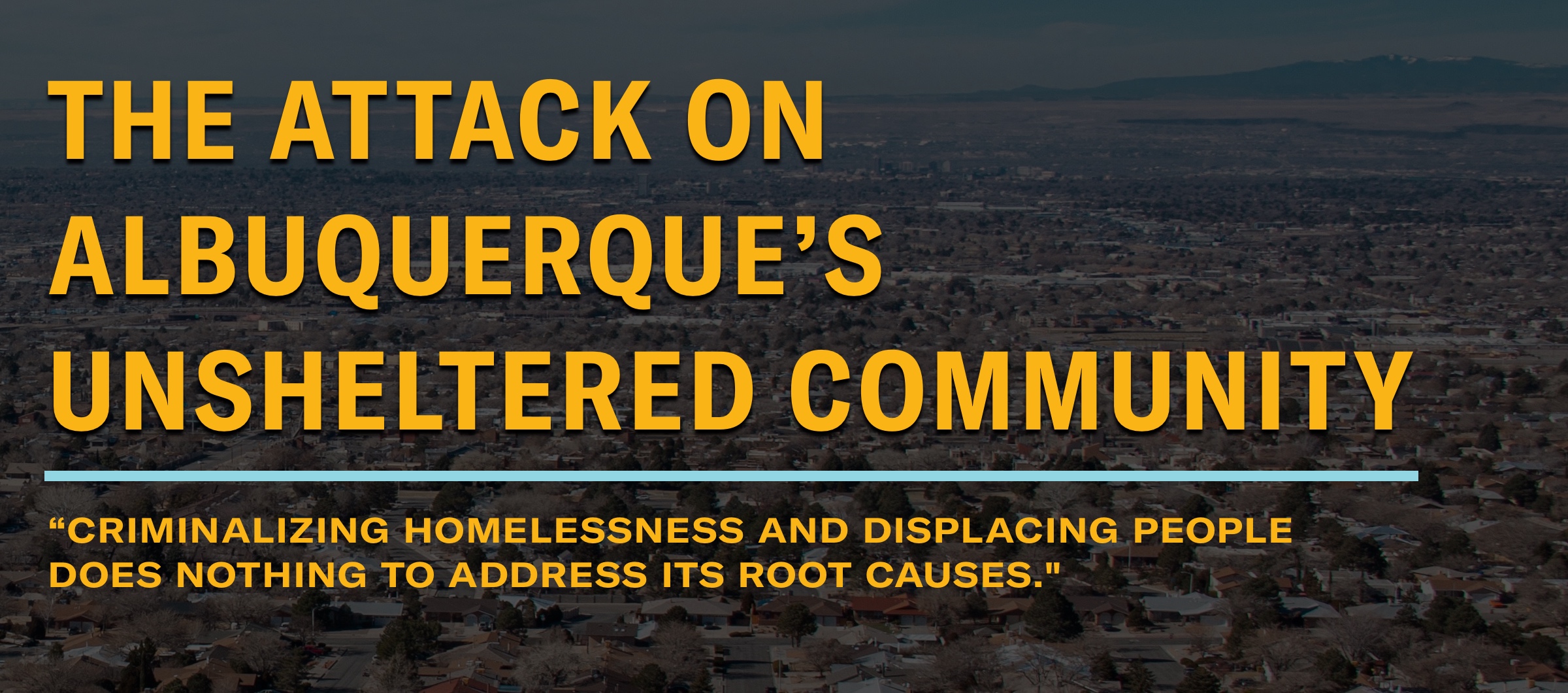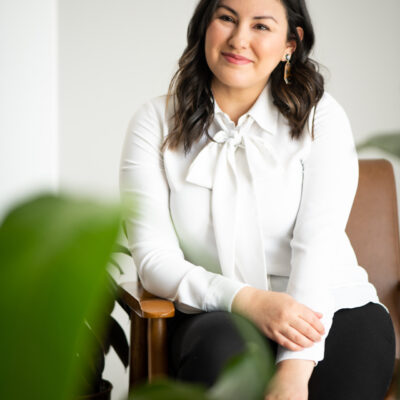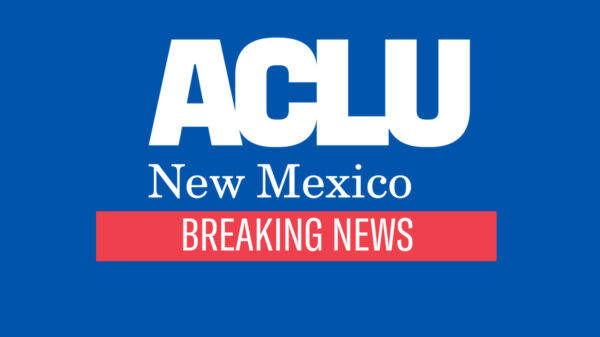Scott Yelton lost his home in September 2019 after losing his job and separating from his wife.
The Albuquerque resident struggled with the many, sometimes life-threatening challenges of being unhoused in New Mexico, but by mid-2022, he had found a way to create some stability and security. He’d begun living in Coronado Park, creating a space where he could stay warm at night, keep his belongings safe and cook himself a hot meal.
“[The city] suddenly closed Coronado Park and threw my stuff in a garbage truck. I begged them to give it back, but they acted like I wasn’t even there,” Scott said. “They took my stove, my tent, sleeping bag, clothes, and my birth certificate. But worse, they took family photos I can never replace.”
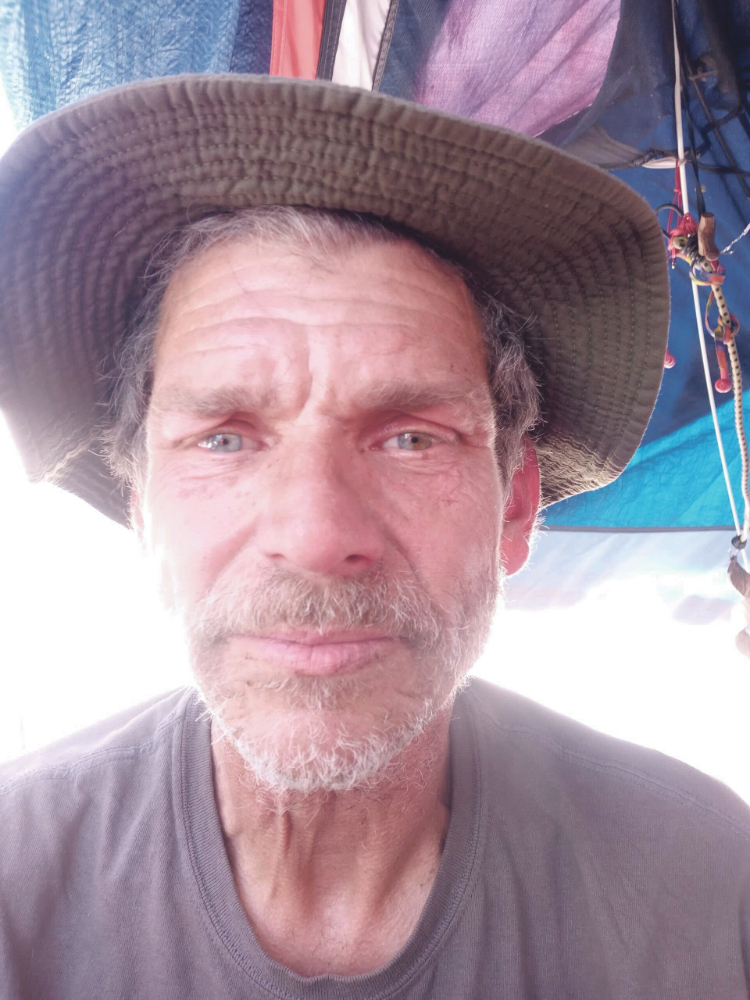
On August 17, 2022, the City of Albuquerque fenced off Coronado Park, forcing unsheltered New Mexicans to leave, often without even the basic items they needed to stay warm at night.
Scott said when the city closed Coronado Park, he and others lost irreplaceable and sentimental personal belongings. But just as painfully they lost a sense of safety and community. This act displaced dozens of unsheltered Burqueños, many of whom still do not have a safe place to stay.
Photo Left: Scott Yelton
Many people displaced by the closure of Coronado Park have been forced to disperse into other areas across the city and continue to be met with shutdowns by the city. Recently, people who had built a small community in the I-40 underpass near 1st Street and Indian School Road were forced to leave by police officers, leaving them again without community or a safe place to sleep.
In Albuquerque, and across the country, rising rents, historically low rental vacancy rates, and the decline of federally subsidized housing have led to a critical shortage of affordable housing units. Rents in Albuquerque increased as much as 20% in the first quarter of 2022. According to data provided by the New Mexico Coalition to End Homelessness, there are more than 1,300 unsheltered people in Albuquerque, many of them children.
"I begged them to give it back, but they acted like I wasn’t even there."
While the city has acknowledged that there are not sufficient beds in existing city-run shelters, there has been little done to help get people housing. Several people, including Scott, said that living on the street was safer than staying at the Westside Shelter, where they faced theft and unsanitary conditions.
“I stayed at the Westside Shelter very briefly, but it was a toxic environment for me,” Scott said. “Believe it or not I felt safer at Coronado Park. Folks looked after one another.”
The housing crisis impacts everyone but disproportionately hurts people with mental health concerns or disabilities that make it hard to find steady work. Being forced to move and having belongings confiscated increases instability, making it even harder to find work, get medications, see a social worker, or find permanent housing. Scott said that without a vehicle, replacing the documents the city threw away took months.
“It was a punch in the gut that the city had thrown my things away,” he said. “Pushing a shopping cart is not a criminal act, but we were treated that way.”
Criminalizing homelessness does not bridge the services gap or create affordable housing units. It only serves to displace and endanger people experiencing homelessness. Constantly forcing people to move and breaking up informal communities creates chaos and instability that undermines the city’s efforts to reduce homelessness.
“I thought, they must be getting paid by the pound. They really were diligent about doing their job. They had no remorse,” Scott said about the city employees who threw away peoples’ belongings during the Coronado Park closure. “They even seemed jovial.”
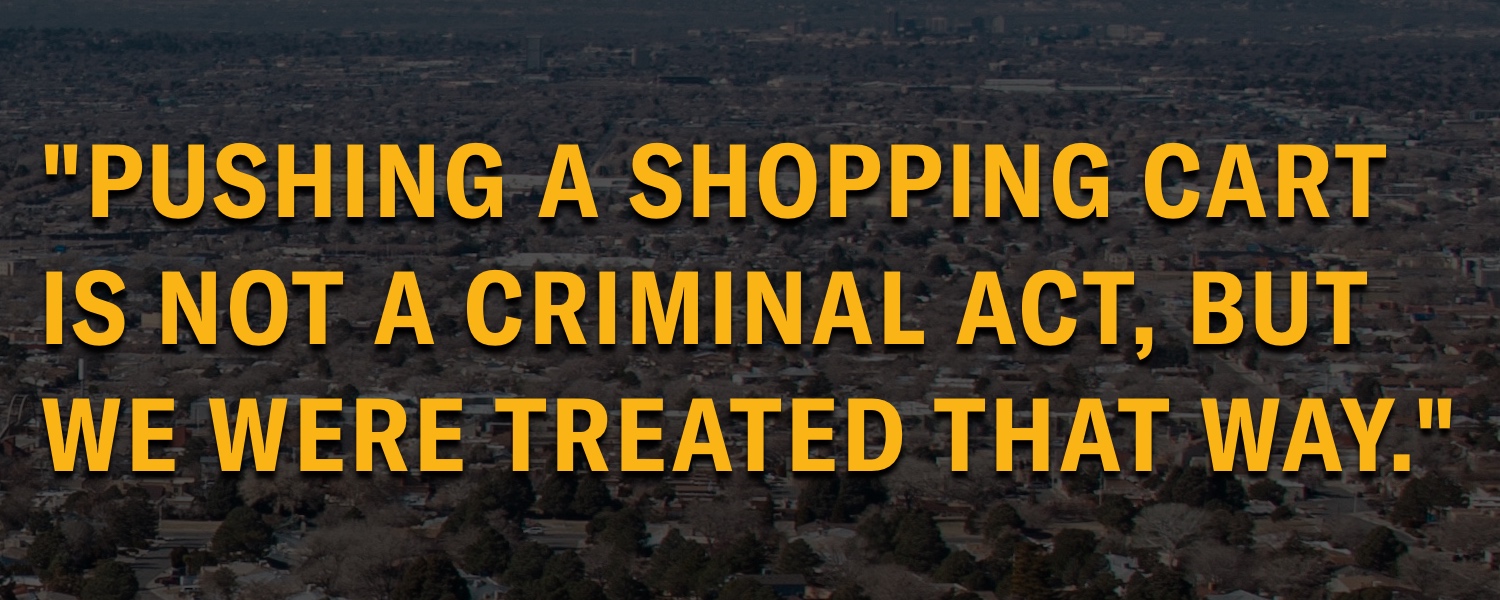
After losing his home and community at Coronado Park, life got harder for Scott.
“It was devastating. I went into a pretty deep depression. Only because I had a few close friends who looked after me, was I able to get by,” he said.
"It was the lowest point in my life.”
"They had no remorse. They even seemed jovial.”
In December, the law firm of Ives and Flores, along with the ACLU-NM, the New Mexico Center on Law and Poverty, and attorney Nick Davis, filed a lawsuit on behalf of unhoused Albuquerqueans including Scott, to stop the city from unlawfully destroying encampments and property, as well as jailing, and fining people simply for not being able to afford a house.
“Criminalizing homelessness and displacing people does nothing to address its root causes,” said Maria Martinez Sanchez, legal director at ACLU-NM. “In fact, it exacerbates the problem. We know the solution – affordable housing. The city just needs to find the will and the courage to make it happen.”
Scott Yelton lost his home in September 2019 after losing his job and separating from his wife.
The Albuquerque resident struggled with the many, sometimes life-threatening challenges of being unhoused in New Mexico, but by mid-2022, he had found a way to create some stability and security. He’d begun living in Coronado Park, creating a space where he could stay warm at night, keep his belongings safe and cook himself a hot meal.
“[The city] suddenly closed Coronado Park and threw my stuff in a garbage truck. I begged them to give it back, but they acted like I wasn’t even there,” Scott said. “They took my stove, my tent, sleeping bag, clothes, and my birth certificate. But worse, they took family photos I can never replace.”

On August 17, 2022, the City of Albuquerque fenced off Coronado Park, forcing unsheltered New Mexicans to leave, often without even the basic items they needed to stay warm at night.
Scott said when the city closed Coronado Park, he and others lost irreplaceable and sentimental personal belongings. But just as painfully they lost a sense of safety and community. This act displaced dozens of unsheltered Burqueños, many of whom still do not have a safe place to stay.
Photo Left: Scott Yelton
Many people displaced by the closure of Coronado Park have been forced to disperse into other areas across the city and continue to be met with shutdowns by the city. Recently, people who had built a small community in the I-40 underpass near 1st Street and Indian School Road were forced to leave by police officers, leaving them again without community or a safe place to sleep.
In Albuquerque, and across the country, rising rents, historically low rental vacancy rates, and the decline of federally subsidized housing have led to a critical shortage of affordable housing units. Rents in Albuquerque increased as much as 20% in the first quarter of 2022. According to data provided by the New Mexico Coalition to End Homelessness, there are more than 1,300 unsheltered people in Albuquerque, many of them children.
"I begged them to give it back, but they acted like I wasn’t even there."
While the city has acknowledged that there are not sufficient beds in existing city-run shelters, there has been little done to help get people housing. Several people, including Scott, said that living on the street was safer than staying at the Westside Shelter, where they faced theft and unsanitary conditions.
“I stayed at the Westside Shelter very briefly, but it was a toxic environment for me,” Scott said. “Believe it or not I felt safer at Coronado Park. Folks looked after one another.”
The housing crisis impacts everyone but disproportionately hurts people with mental health concerns or disabilities that make it hard to find steady work. Being forced to move and having belongings confiscated increases instability, making it even harder to find work, get medications, see a social worker, or find permanent housing. Scott said that without a vehicle, replacing the documents the city threw away took months.
“It was a punch in the gut that the city had thrown my things away,” he said. “Pushing a shopping cart is not a criminal act, but we were treated that way.”
Criminalizing homelessness does not bridge the services gap or create affordable housing units. It only serves to displace and endanger people experiencing homelessness. Constantly forcing people to move and breaking up informal communities creates chaos and instability that undermines the city’s efforts to reduce homelessness.
“I thought, they must be getting paid by the pound. They really were diligent about doing their job. They had no remorse,” Scott said about the city employees who threw away peoples’ belongings during the Coronado Park closure. “They even seemed jovial.”

After losing his home and community at Coronado Park, life got harder for Scott.
“It was devastating. I went into a pretty deep depression. Only because I had a few close friends who looked after me, was I able to get by,” he said.
"It was the lowest point in my life.”
"They had no remorse. They even seemed jovial.”
In December, the law firm of Ives and Flores, along with the ACLU-NM, the New Mexico Center on Law and Poverty, and attorney Nick Davis, filed a lawsuit on behalf of unhoused Albuquerqueans including Scott, to stop the city from unlawfully destroying encampments and property, as well as jailing, and fining people simply for not being able to afford a house.
“Criminalizing homelessness and displacing people does nothing to address its root causes,” said Maria Martinez Sanchez, legal director at ACLU-NM. “In fact, it exacerbates the problem. We know the solution – affordable housing. The city just needs to find the will and the courage to make it happen.”

